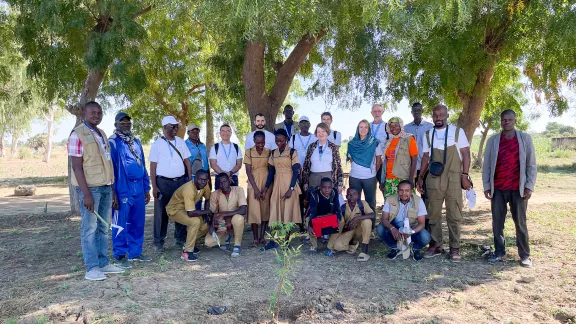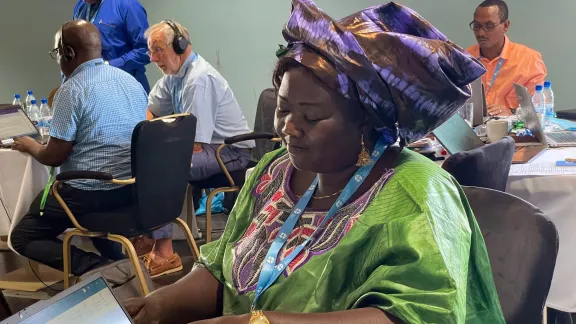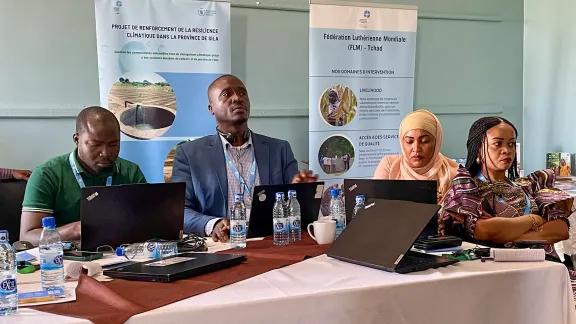
A group from the Regional Management Team Meeting for francophone Africa visited communities in Kousseri (Cameroon), near N'Djamena. Located close to the Logone river, they are experiencing the effects of climate change in an already vulnerable situation. Photo: LWF/ C. Kästner-Meyer
World Service programs in francophone Africa discuss strategy at Regional Management Team Meeting
(LWI) - The biblical story of the loaves and fishes offers a profound metaphor for the challenges of humanitarian work. Mathieu Idjawo, Program Coordinator for The Lutheran World Federation (LWF) Cameroon country program, set the tone for the Francophone Regional Management Team Meeting (RMTM) with a morning devotion on John 6:5-13. “As humanitarians, don’t we often find ourselves in similar situations, where the needs seem endless, and the resources dwindle?” he asked. “We could almost title this passage: Humanitarian Crisis – What’s the Strategy?”
From 2 to 5 December 2024, the management teams of the four LWF World Service programs in Burundi, Cameroon, the Central African Republic (CAR), and Chad convened in N’Djamena, Chad, under the theme “Forward-Looking for Quality Implementation of LWF World Service Country Strategies.” Joined by representatives from Canadian Lutheran World Relief (CLWR), Diakonie Katastrophenhilfe (DKH), and Finn Church Aid (FCA), they refined strategic approaches and exchanged best practices for addressing the humanitarian crises in their region which face critical funding shortfalls.
Serving the most vulnerable
The conflict in Sudan has driven over 600,000 refugees to eastern Chad, while Chad and Cameroon also face displacement from the Boko Haram militant group the Central African Republic crisis, and internal conflicts. Burundi hosts refugees from neighboring countries but struggles with its own citizens unable to return due to economic instability and fragile peace. The refugees live in communities ranked low on the global development index. Climate change, through floods, droughts, storms, and diseases, worsens the challenges for both displaced people and their hosts.

Gender justice, localization and climate change were part of th strategic deliberations. Photo: LWF/ C. Kästner-Meyer

The meeting brought together LWF partner agencies and the management teams of four country programs. Photo: LWF/ C. Kästner-Meyer
LWF’s work in this region has traditionally been funded by institutional donors. However, in recent years, institutional donors have significantly reduced their support. As a result, LWF is increasingly relying on its member churches and their diaconal agencies, whose contributions are vital to continuing its mission, says Clovis Mwambutsa, LWF Regional Program Coordinator for Francophone Africa. “In recent years, they have ensured that we can continue serving the most vulnerable by responding to emergencies and addressing protracted needs.”
Support each other
For four days, the meeting participants discussed various aspects of their work, focusing also on gender aspects, partnerships and localization. Field visits to a cross-border project with Cameroon in the Lake Chad region, as well as pre- and post-visits of some participants to Bol in the Lake Chad region and Farchana at the Sudanese border provided practical impressions of the needs, the work done, and the logistical challenges of accessing people in need.
This meeting is an opportunity for our country programs in the region to look at their strategies together.
Clovis MWAMBUTSA, Regional Program Coordinator
“This meeting is an opportunity for our country programs in the region to look at their strategies together. Having a francophone meeting also means that country teams are more at ease in group discussion, which gives valuable insights into their work,” Mwambutsa adds.
“We discussed strategy, and how to support each other, but based on examples from the field. It was a very practical approach,” Ngolsou Keting, LWF Country Representative in Chad, adds. “More connections, global discussions, I found this meeting very helpful”.


